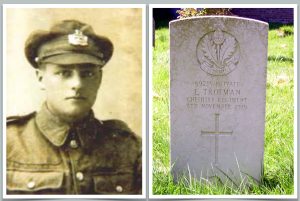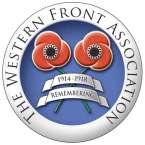1/4th Battalion, Cheshire Regiment

Edwin Andrew Trotman was born at Hystfield, near Stone on 29 September 1899. He was the fourth of eight children born to John Trotman and his wife Gertrude (née Jefferies).
John was a farm hand prior to being conscripted for army service at Gloucester on 25 May 1918 aged 18 and was living at Hystfield.
He was initially posted to the 4th Battalion of the Gloucestershire Regiment and given the number 51782 and transferred to the King’s Shropshire Light Infantry (as 30047) on 29 September 1918.
This date coincided with his 19th birthday and a transfer abroad.
He was to remain abroad until 6 August 1919 having been posted to the 1/4th Battalion, Cheshire Regiment on 20 March 1919 (number 69285) and latterly served with them in the Army of Occupation in Germany. The Cheshires were part of 102 Brigade, 34 Division who had taken part in the final advance in Flanders and on 11 November 1918 were at rest east of Courtrai, moving to Germany on 14 November and by the end of January occupying the Cologne bridgehead.
From March 1919 onwards the 1/4th Cheshires were part of Western Division, 1st Infantry Brigade, British Army of the Rhine (BAOR). The Armistice provided for British, French and US troops to occupy bridgeheads across the Rhine, BAOR being formed to occupy the British Control Zone.
Private Trotman’s return to the UK was the result of having contracted trench fever in July 1919 whilst in Germany. He was sent to England and it was discovered that he had contracted diphtheria and was admitted to Park Hospital (location unknown) on 4 August.
He was transferred to a hospital in Dartford, Kent and then, on 16 August, to Bermondsey Military Hospital, Ladywood Lodge, Ladywell, near Lewisham, in south London. This had facilities to cater for the isolation of infectious cases.
He was now placed on the strength of the Base Depot of the Cheshire Regiment.
Progress towards recovery appeared to be well underway, as he was discharged on furlough on 7 November 1919 and he returned home to Hystfield.
On the night of the 8/9 November he committed suicide by shooting himself.
He had served for one year and 168 days in the Army.
A letter written to the War Office by a Mr A H Fyffe, of Stone Court, Falfield (on behalf of Edwin’s father) stated that Edwin (only just 20 years) appeared ‘to have had very much on his mind, having to go back to a new battalion’.
An inquest concluded that his death was the result of suicide, whilst of unsound mind.
Private Edwin Andrew Trotman was buried in Stone (All Saints’) Churchyard, where a Commonwealth War Graves Commission headstone now marks his grave.
Research by Graham Adams 11 May 2018
